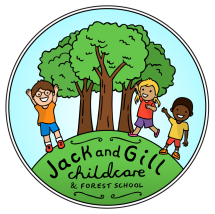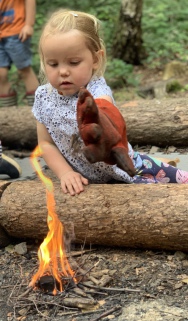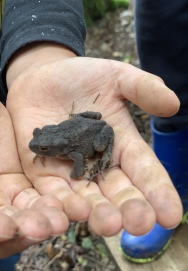
Jack and Gill Childcare and Forest School
The natural approach to learning
We nurture children to grow into confident, imaginative, and respectful individuals.
Research suggests that humans are naturally drawn to the things that support our wellbeing and survival—perhaps that’s why trees and time outdoors have such a powerful effect on lifting our mood.
At Jack and Gill, children learn hands-on skills such as planting, making charcoal, chopping and sawing wood, identifying trees by their leaves and bark, and developing a deep respect for all living things.
.
The Power of Play
At Jack and Gill, we believe play is one of the most valuable parts of childhood. It’s how children make sense of the world — testing ideas, solving problems, and following their natural curiosity.
In our forest school approach, play is child-led and guided by trained staff. Children develop teamwork, resilience, imagination, and a deep respect for nature. Whether they are exploring on their own or with friends, play helps them build confidence, take healthy risks, and discover their own way of thinking.
Decades of research show that child-directed play nurtures the whole child — supporting their social, emotional, physical, and cognitive development. Quite simply, play prepares children not just for school, but for life.
Why the Outdoors Matters
At Jack and Gill, we know that being outdoors is more than just fresh air — it’s proven to reduce stress, calm the brain, and open children up to deeper learning. The sense of freedom found in wide, open spaces simply cannot be recreated indoors, no matter how many windows a building may have.
Our forest school approach recognises that exercise in natural spaces supports children’s emotional wellbeing, helping them to relax, feel calm, and grow in confidence. For generations, children have thrived outdoors, and research shows these experiences make a lasting positive impact on both health and development.
With us, children have daily opportunities to:
-
Be excited, noisy, energetic, and messy.
-
Dream, imagine, invent, and create.
-
Build, construct, and deconstruct.
-
Investigate, experiment, explore, and discover.
-
Run, jump, climb, balance, and strengthen their bodies.
-
Dig, grow, nurture, and care for living things.
-
Hide, relax, reflect, and find calm.
-
Take responsibility, build independence, and collaborate with others.
At Jack and Gill, the outdoors isn’t just where we play — it’s where children grow, explore, and begin to understand their place in the world.




